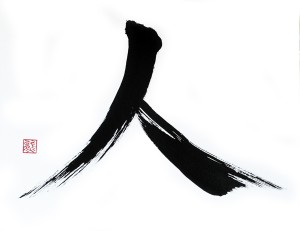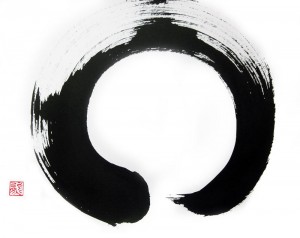Zen with Brush and Ink
The room is prepared: newspaper, neatly unfolded and secured by two stones, an ink-stone filled with ink and water, two big Japanese brushes … the scent of incense and black ink in the air. I still vividly remember my first encounter with Hitsuzendo, the Zen-practice with brush and ink!
After two rounds of Zazen we all gathered in a room above the Zendo. The teacher bowed, kneeled down in front of the newspaper, took the brush, loaded it with ink and took a deep breath while lifting the brush. A moment of absolute silence and concentration, and then, like the thunder following a flash, he wrote a big Japanese character in one single stroke. He stood up, looked at his drawing, bowed again, and now it was our turn to write…

Like this, I have been exercising for more than 13 years. Zazen – Hitsuzendo – Zazen – Hitsuzendo … the same rhythm, each Sesshin, each morning, year by year.
As a beginner, you learn how to take and hold the brush, draw a simple line or symbol, and put back the brush where it was without spilling black ink everywhere. Then, you practice to write with your whole body, to co-ordinate and unify mind and body with your breath.
 By and by, you start to discover Your Self in the traces of ink you leave behind on the paper. Your strength, your weakness, your ego and desire to write beautiful (or more beautiful than your fellow students or your teacher). You see your concentration and your fluttering mind. Your ugliness and your beauty!
By and by, you start to discover Your Self in the traces of ink you leave behind on the paper. Your strength, your weakness, your ego and desire to write beautiful (or more beautiful than your fellow students or your teacher). You see your concentration and your fluttering mind. Your ugliness and your beauty!
With years and years of writing, you slowly become your calligraphy. No difference between the stroke on the paper and the person you are. After writing, you stand up, look and bow: ah, that’s me today!
You can’t hide anything in a line
(Kazuaki Tanahashi, whom I unfortunately never met …)


